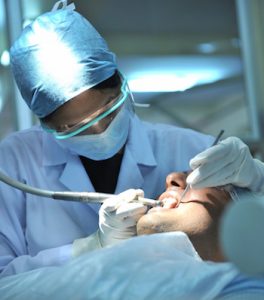Why would I need oral and maxillofacial surgery?
What is Oral and Maxillofacial Surgery?

Oral and maxillofacial surgery is essentially surgery of the oral and facial region. It involves the diagnosis, surgery and treatment of diseases, injuries and defects involving the mouth, gums, teeth and jaws – including how they function and how they look.
Oral and maxillofacial surgery often takes the form of dento-alveolar surgery, such as surgery related to wisdom teeth and other impacted teeth. It also involves surgery for oral pathology, such as cysts of the jaws.
Included in the scope of practice is implantology – that is, replacing missing teeth with the aid of titanium screws implanted into the jawbone. Full mouth rehabilitation with implants may also be performed; and when there is a lack of bone to support implants, additional bone grafting procedures may be required.
Corrective jaw surgery (orthognathic surgery) is a treatment undertaken in conjunction with an orthodontist to align jaws in proper relationship to ensure good bite and facial proportions.
Oral cancers and tumours are also diagnosed and treated by oral and maxillofacial surgeons. Such procedures involve resecting the tumours of the oral cavity and reconstructing with tissue from elsewhere in the body (such as the forearms or legs).
Temporomandibular joint (TMJ) dysfunction can also be treated with surgery in certain cases and this may involve complete joint reconstruction with replacements.
Whether you require simple dental extractions or major surgery, your surgeon will liaise with your general practitioner and/or other medical specialists to coordinate your specialist care, thus ensuring that your procedure is completed in a safe and reliable manner.
Oral and maxillofacial surgeons have admitting rights to many private hospitals and can therefore provide your treatment in an accredited hospital facility under general anaesthesia if required.
You will be able to receive a Medicare rebate for a portion of your consultation fee, and for any relevant medical investigations such as imaging and blood tests ordered. You will also be able to receive a Medicare rebate or health fund rebate for any aspect of your treatment that is classified as medical, including bone grafting surgery for implant placement, jaw reconstructive procedures, and facial trauma surgery.
What is an Oral and Maxillofacial Surgeon?
Oral and maxillofacial surgeons undergo continuous study for 12 to 14 years and hold Degrees in general dentistry and surgical medicine, as well as a Masters degree in Oral and Maxillofacial Surgery. They may hold further Masters degrees dependent on their interest or specialty, such as paediatric maxillofacial surgery or surgical anatomy.
Most oral and maxillofacial surgeons work in public and private hospitals, where they reconstruct facial form and function after facial trauma. Facial fracture patients and congenital deformity patients such as cleft lip and palate patients will have their facial reconstruction carried out by an oral and maxillofacial surgeon.
Oral and Maxillofacial Surgeons are registered specialists with the Dental Board of Australia and the Royal Australasian College of Dental Surgeons upon successfully completing their final specialty examinations (FRACDS). Always check the Australian Health Practitioner Regulation Agency (AHPRA) website to check the registration of a specialist.

